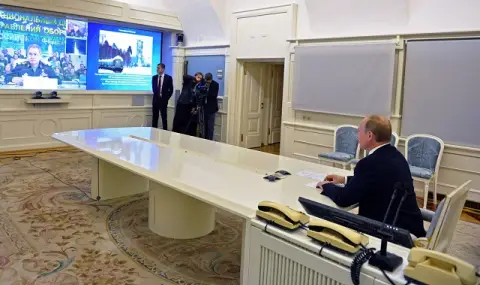Threats from Russia should be divided into virtual and real, which the West is increasingly doing. Although Putin is not ready to drop a nuclear bomb, he remains dangerous enough, according to Ivan Preobrazhensky.
US President Joe Biden assesses as "unlikely" the possibility of his country and its NATO allies being drawn into direct war with the Kremlin for allowing the Ukrainian military to use Western long-range weapons on Russian territory. Germany does not want to comment seriously on the recent outright blackmail by Vladimir Putin, who once again said that they should not force Russia to use nuclear weapons.
Does this mean that the Kremlin's threats should not be taken seriously? And could NATO's actions provoke a world war, which many see as almost inevitable after Russia's full-scale aggression against Ukraine?
Putin's threats and the West's reaction
Volodymyr Zelensky "is going around the world trying to drag as many countries as possible into war, bringing Russia's conventional conflict with Ukraine to a global nuclear war," repeat Russian propagandists, starting with Vladislav Surkov, the overt and covert allies of Putin in the West such as Hungarian Prime Minister Viktor Orbán and finally the ordinary citizens of Western countries who neither want nor are ready to go to war. Putin has fueled these passions by openly threatening to use an atomic bomb and speculating on the population density of European countries in the context of a possible nuclear strike, as well as recalling Russia's nuclear doctrine, which allows for the preemptive use of such weapons in the event of a threat to the sovereignty of the country.
These threats, however, have the worse effect on Western and Ukrainian politicians the more often they are repeated. Take our president seriously, Russian diplomats are almost begging, but their efforts seem futile. There is a simple logic at work here: if Russia did not use nuclear weapons when it could have turned the tide of the war, and did not use them after Ukraine began striking Crimea and the Black Sea Fleet, where is the "red line" that really does not would leave Putin a choice?
Is this a landing in Moscow or a strike on the Kremlin? Perhaps, but the West will neither do it alone nor allow Ukraine to take such steps now, as Joe Biden has made clear. And if that is the case, is it possible that Russia's threats can simply be dismissed?
Hybrid threats from the Kremlin
In reality, the Kremlin should still be taken seriously. Moscow is fighting a war in Europe, the biggest since the end of World War II. Russia is a master of hybrid threats, attacking the West in Central Africa and the Persian Gulf using various "proxies" and "green men".
In France, near an airport, a suspected Russian fighter from Donbas was arrested with a homemade bomb. Poland is conducting one operation after another to arrest Russian saboteurs with passports from different countries. One after another, Western intelligence services have warned of the threat of Russian sabotage. Finally, the Kremlin flirts with terrorists such as Hamas, the Afghan Taliban or the Yemeni Houthis - and explicitly threatens to supply them with weapons.
Vladimir Putin can do all of this, as opposed to using a nuclear bomb at this stage of the war. And it is precisely these threats that the authorities of the Western countries must really evaluate as serious, finally convincing the population of their countries that the war with Russia is not in some distant future, but is already being fought. It doesn't matter if they want it or not - the important thing is that Putin acts in this way.
However, this does not mean that the West should stop acting. The strategy of putting pressure on an opponent who understands only strength is the most correct. Moreover, every change in strategy opens up new opportunities.
Compulsion to restore borders
The decision of Western countries to allow Ukraine to strike aircraft and military installations of "domestic" Russian territory has another, less obvious consequence. Thus, the United States, Germany and other NATO allies are forcing Vladimir Putin to admit that there are still territories and, more importantly, borders with different statuses - unconditional and relative.
For many months, the Kremlin has endured strikes in Crimea and Sevastopol, not to mention constant military operations in the territories occupied by the Russian army after February 24, 2022. Now, repeating once again that it will not tolerate bombardment with Western weapons far beyond the Russian border, Vladimir Putin personally assures that, despite the fake referendums, even he himself does not consider the occupied lands to be his sovereign territory.
Whether the Russian authorities want it or not, this makes their claimed sovereignty over not only Ukraine's Donetsk or Zaporozhye regions, but even Crimea, relative and negotiable. This means that it is not difficult to foresee the inevitable next step: a proposal to the Kremlin to offer to discuss the possibility of returning the stolen territories in exchange for the inviolability of Russia's internationally recognized territories within the peace negotiations.
